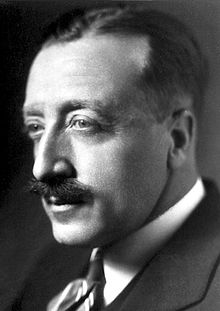John Howard Northrop
John Howard Northrop (born July 5, 1891 in Yonkers, New York; † May 27, 1987 in Wickenburg, Arizona) was a US biochemist.
Northrop was born to John I, who was a zoologist and teacher at Columbia University. His mother, Alice R. Northrop, was a teacher of botany at Hunter College. John I. died of an explosion in the laboratory two weeks before his son was born.
John Howard studied at Columbia University, where he received his doctorate in chemistry in 1915. During World War II, he researched the production of acetone and ethanol by fermentation for the U.S. Army Chemical Warfare Service.
In 1929 Northrop isolated pepsin and classified it as a protein. In 1938 he was the first to isolate and characterize bacteriophages and determined them to be nucleoproteins. Furthermore, Northrop isolated and crystallized pepsinogen (the proenzyme of pepsin), trypsin, chymotrypsin, and carboxypeptidase. In 1932 he was elected a member of the Leopoldina.
For his 1939 book Crystalline Enzymes: The Chemistry of Pepsin, Trypsin, and Bacteriophage, Northrop received the Daniel Giraud Elliot Medal of the National Academy of Sciences, of which he had been a member since 1934. He had been an elected member of the American Philosophical Society since 1938. In 1949 he was inducted into the American Academy of Arts and Sciences.
Northrop was employed at the Rockefeller Institute for Medical Research in New York from 1916 to 1961. In 1949 he became professor of bacteriology at the University of California, Berkeley, and later professor of biophysics.
Northrop, along with Wendell Meredith Stanley, received half of the Nobel Prize in Chemistry in 1946 "for their presentation of enzymes and viral proteins in pure form." The second half of the prize went to James Batcheller Sumner.
In 1917 Northrop married Louise Walker, with whom he had two children. Son John became an oceanographer, while daughter Alice married Nobel Prize winner Frederick C. Robbins married. Northrop died by suicide in 1987 in Wickenberg, Arizona.

John Howard Northrop 1946
Questions and Answers
Q: Who was John Howard Northrop?
A: John Howard Northrop was an American biochemist.
Q: What recognition did John Howard Northrop receive for his work?
A: John Howard Northrop shared the 1946 Nobel Prize in Chemistry with James Batcheller Sumner and Wendell Meredith Stanley. He was also elected a Fellow of the American Academy of Arts and Sciences in 1949.
Q: Where was John Howard Northrop employed and for how long?
A: John Howard Northrop was employed by the Rockefeller Institute for Medical Research in New York City from 1916 until his retirement in 1961.
Q: What was John Howard Northrop's position at the University of California, Berkeley?
A: In 1949, John Howard Northrop was appointed Professor of Bacteriology and later, Professor of Biophysics at the University of California, Berkeley.
Q: What were John Howard Northrop's areas of expertise?
A: John Howard Northrop was a biochemist and had expertise in bacteriology and biophysics.
Q: When was John Howard Northrop born and when did he pass away?
A: John Howard Northrop was born on July 5, 1891 and he passed away on May 27, 1987.
Q: Who did John Howard Northrop share the Nobel Prize in Chemistry with and in what year?
A: John Howard Northrop shared the 1946 Nobel Prize in Chemistry with James Batcheller Sumner and Wendell Meredith Stanley.
Search within the encyclopedia